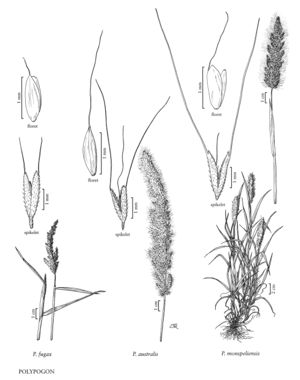Difference between revisions of "Polypogon monspeliensis"
FNA>Volume Importer |
imported>Volume Importer |
||
| (4 intermediate revisions by 2 users not shown) | |||
| Line 17: | Line 17: | ||
-->{{Treatment/Body | -->{{Treatment/Body | ||
|distribution=Idaho;Mont.;Wash.;Alta.;B.C.;Man.;Ont.;Que.;Sask.;Yukon;Del.;Wis.;Pacific Islands (Hawaii);Fla.;Wyo.;N.H.;N.J.;N.Mex.;Tex.;La.;Tenn.;N.C.;S.C.;Pa.;N.Y.;Calif.;Nev.;Va.;Colo.;Alaska;Ala.;Kans.;N.Dak.;Nebr.;Okla.;S.Dak.;Mass.;Maine;Ark.;Ga.;Ariz.;Conn.;Md.;Utah;Minn.;Mich.;Miss.;Oreg. | |distribution=Idaho;Mont.;Wash.;Alta.;B.C.;Man.;Ont.;Que.;Sask.;Yukon;Del.;Wis.;Pacific Islands (Hawaii);Fla.;Wyo.;N.H.;N.J.;N.Mex.;Tex.;La.;Tenn.;N.C.;S.C.;Pa.;N.Y.;Calif.;Nev.;Va.;Colo.;Alaska;Ala.;Kans.;N.Dak.;Nebr.;Okla.;S.Dak.;Mass.;Maine;Ark.;Ga.;Ariz.;Conn.;Md.;Utah;Minn.;Mich.;Miss.;Oreg. | ||
| − | |discussion=<p>Polypogon monspeliensis is native to southern Europe and Turkey. It is now a common weed throughout the world, including much of the Flora region. It grows in damp to wet, often alkaline soils, particularly in disturbed areas. Vernon Harms (pers. comm., 2005) commented that the species' distribution in Saskatchewan appears to have increased greatly since the 1970s. The English-language name aptly describes the feel of the young panicles.</p><!-- | + | |discussion=<p><i>Polypogon monspeliensis</i> is native to southern Europe and Turkey. It is now a common weed throughout the world, including much of the Flora region. It grows in damp to wet, often alkaline soils, particularly in disturbed areas. Vernon Harms (pers. comm., 2005) commented that the species' distribution in Saskatchewan appears to have increased greatly since the 1970s. The English-language name aptly describes the feel of the young panicles.</p><!-- |
| − | --><p>In Europe, Polypogon monspeliensis hybridizes with Agrostis stolonifera, producing the sterile xAgropogon lutosus (p. 668); and with P. viridis, forming P. xadscendens Guss. ex Bertol. Only xAgropogon lutosus has been reported from the Flora region. It differs from P. monspeliensis in having more persistent spikelets, less blunt short-awned glumes, and lemmas with sub-terminal rather than terminal awns.</p> | + | --><p>In Europe, <i>Polypogon monspeliensis</i> hybridizes with <i>Agrostis stolonifera</i>, producing the sterile xAgropogon lutosus (p. 668); and with <i>P. viridis</i>, forming P. xadscendens Guss. ex Bertol. Only xAgropogon lutosus has been reported from the Flora region. It differs from <i>P. monspeliensis</i> in having more persistent spikelets, less blunt short-awned glumes, and lemmas with sub-terminal rather than terminal awns.</p> |
|tables= | |tables= | ||
|references= | |references= | ||
| Line 27: | Line 27: | ||
-->{{#Taxon: | -->{{#Taxon: | ||
name=Polypogon monspeliensis | name=Polypogon monspeliensis | ||
| − | |||
|authority=(L.) Desf. | |authority=(L.) Desf. | ||
|rank=species | |rank=species | ||
| Line 35: | Line 34: | ||
|family=Poaceae | |family=Poaceae | ||
|illustrator=Cindy Roché | |illustrator=Cindy Roché | ||
| + | |illustration copyright=Utah State University | ||
|distribution=Idaho;Mont.;Wash.;Alta.;B.C.;Man.;Ont.;Que.;Sask.;Yukon;Del.;Wis.;Pacific Islands (Hawaii);Fla.;Wyo.;N.H.;N.J.;N.Mex.;Tex.;La.;Tenn.;N.C.;S.C.;Pa.;N.Y.;Calif.;Nev.;Va.;Colo.;Alaska;Ala.;Kans.;N.Dak.;Nebr.;Okla.;S.Dak.;Mass.;Maine;Ark.;Ga.;Ariz.;Conn.;Md.;Utah;Minn.;Mich.;Miss.;Oreg. | |distribution=Idaho;Mont.;Wash.;Alta.;B.C.;Man.;Ont.;Que.;Sask.;Yukon;Del.;Wis.;Pacific Islands (Hawaii);Fla.;Wyo.;N.H.;N.J.;N.Mex.;Tex.;La.;Tenn.;N.C.;S.C.;Pa.;N.Y.;Calif.;Nev.;Va.;Colo.;Alaska;Ala.;Kans.;N.Dak.;Nebr.;Okla.;S.Dak.;Mass.;Maine;Ark.;Ga.;Ariz.;Conn.;Md.;Utah;Minn.;Mich.;Miss.;Oreg. | ||
|reference=None | |reference=None | ||
| Line 40: | Line 40: | ||
|publication year= | |publication year= | ||
|special status= | |special status= | ||
| − | |source xml=https:// | + | |source xml=https://bitbucket.org/aafc-mbb/fna-data-curation/src/200273ad09963decb8fc72550212de541d86569d/coarse_grained_fna_xml/V24/V24_938.xml |
|subfamily=Poaceae subfam. Pooideae | |subfamily=Poaceae subfam. Pooideae | ||
|tribe=Poaceae tribe Poeae | |tribe=Poaceae tribe Poeae | ||
Latest revision as of 16:26, 11 May 2021
Plants annual. Culms 5-65 (100) cm, erect to geniculately ascending. Sheaths glabrous, the uppermost sheaths sometimes inflated; ligules 2.5-16 mm; blades 1-20 cm long, 1-7 mm wide. Panicles 1-17 cm, narrowly ellipsoid, dense, sometimes lobed, greenish; pedicels absent or to 0.2 mm; stipes 0.1-0.2 mm. Glumes 1-2.7 mm, hispidulous throughout, largest prickles restricted to the lower 1/2, apices rounded, lobed, lobes 0.1-0.2 mm, 1/10 or less the length of the glume body, awned from the sinus, awns 4-10 mm, yellowish; lemmas 0.5-1.5 mm, glabrous, awned, awns 0.5-1(4.5) mm; paleas subequal to the lemmas; anthers 0.2-1 mm. 2n = 14, 28, 35, 42.
Distribution
Idaho, Mont., Wash., Alta., B.C., Man., Ont., Que., Sask., Yukon, Del., Wis., Pacific Islands (Hawaii), Fla., Wyo., N.H., N.J., N.Mex., Tex., La., Tenn., N.C., S.C., Pa., N.Y., Calif., Nev., Va., Colo., Alaska, Ala., Kans., N.Dak., Nebr., Okla., S.Dak., Mass., Maine, Ark., Ga., Ariz., Conn., Md., Utah, Minn., Mich., Miss., Oreg.
Discussion
Polypogon monspeliensis is native to southern Europe and Turkey. It is now a common weed throughout the world, including much of the Flora region. It grows in damp to wet, often alkaline soils, particularly in disturbed areas. Vernon Harms (pers. comm., 2005) commented that the species' distribution in Saskatchewan appears to have increased greatly since the 1970s. The English-language name aptly describes the feel of the young panicles.
In Europe, Polypogon monspeliensis hybridizes with Agrostis stolonifera, producing the sterile xAgropogon lutosus (p. 668); and with P. viridis, forming P. xadscendens Guss. ex Bertol. Only xAgropogon lutosus has been reported from the Flora region. It differs from P. monspeliensis in having more persistent spikelets, less blunt short-awned glumes, and lemmas with sub-terminal rather than terminal awns.
Selected References
None.
